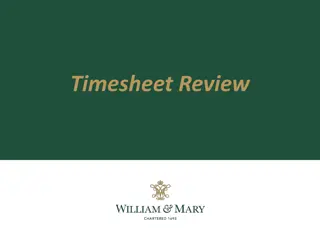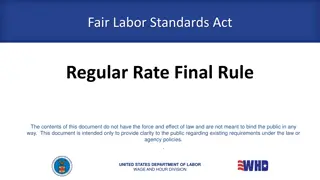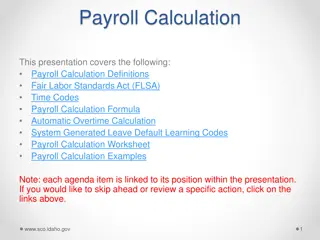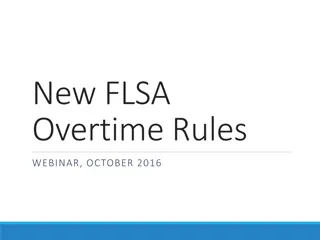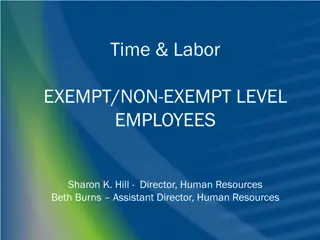
2024 Changes to Overtime Rules Under FLSA
Learn about the upcoming changes to the Fair Labor Standards Act (FLSA) overtime rules in 2024, including increases in minimum salary requirements for exempt employees and how this impacts businesses like MURC. Discover the key points and implications of the new regulations.
Download Presentation

Please find below an Image/Link to download the presentation.
The content on the website is provided AS IS for your information and personal use only. It may not be sold, licensed, or shared on other websites without obtaining consent from the author. If you encounter any issues during the download, it is possible that the publisher has removed the file from their server.
You are allowed to download the files provided on this website for personal or commercial use, subject to the condition that they are used lawfully. All files are the property of their respective owners.
The content on the website is provided AS IS for your information and personal use only. It may not be sold, licensed, or shared on other websites without obtaining consent from the author.
E N D
Presentation Transcript
FLSA OVERTIME RULE CHANGES 2024
OBJECTIVES & KEY POINTS FLSA CHANGES 2024 MURC PLAN OF ACTION PENALTIES 2
FAIR LABOR STANDARDS ACT (FLSA) FLSA First enacted in 1938, established tests that must be met in order for an employee to be exempt from overtime pay eligibility Tests/rules for classifying covered employees as exempt or nonexempt Required overtime compensation to nonexempt employees for all hours over 40 in a workweek 1.5 times regular pay rate 3
WHAT ARE THE 2024 OVERTIME CHANGES? Raised minimum salary required for employee to be classified as exempt from overtime Raising the standard salary level from the currently enforced level of $684 per week to $1128 per week (equivalent to $58,656 per year for full-year work) Raising the total annual compensation requirement for highly compensated employees from the currently enforced level of $107,432 per year to $151,168 The final rule is effective on July 1, 2024 and January 1, 2025 The final rule is effective on July 1, 2024 and January 1, 2025
HOW DOES THIS CHANGE IMPACT MURC? Increased salary/non-exempt employees (maintain benefits eligibility but are eligible for overtime pay) Supervisors/PIs will have to manage overtime more closely. Overtime will need to be approved and budgeted in advance Employees converted from salary/exempt to salary/non-exempt will have to be paid for all hours worked over 40 in the work week. Checking email and doing work outside of the normal work schedule will change the way these converted employees accomplish the day to day work after July 1, 2024 5
HOW DOES THIS CHANGE IMPACT MURC? Converted employees are now eligible for overtime Overtime pay for over 40 hours worked per week Converted employees must accurately track hours worked on Salary/Non-Exempt timesheet Managers will have to monitor and approve overtime in advance; documentation for overtime must be included with timesheet when applicable 6
CAN AN EMPLOYEE MAINTAIN AN EXEMPT CLASSIFICATION? In order for current exempt employees to maintain an exemption status, they must meet both the salary and duties test. Duties Test the employee s job duties must primarily involve executive, administrative, professional, computer, or outside sales duties (also known as EAP or white collar duties) Salary Basis/Level Test the employee must be paid a predetermined and fixed salary that is not subject to reduction because of variations in the quality or quantity of work Under the salary test, the employee must be paid $58,656 or more annually 7
PLAN OF ACTION Provide supervisors/PIs/ Department Contacts with a list of all impacted employees Convert all salary/exempt jobs paid under $58,656 to salary/non- exempt effective 7/1/2024 Notify employees and supervisors of exemption changes and send the appliable Salary/Non-Exempt timesheet to affected employees 8
PLAN OF ACTION CONTINUED INCREASE INCREASE employee salary to $58,656 to avoid higher cost due to employee salary to $58,656 to avoid higher cost due to the inability to avoid overtime the inability to avoid overtime LIMIT LIMIT employee to working 37.5 hours per week and/or paying employee to working 37.5 hours per week and/or paying some overtime; annual salary remains under $58,656 some overtime; annual salary remains under $58,656 MANAGE MANAGE departments must manage overtime and it must be departments must manage overtime and it must be approved in advance with documentation included with monthly approved in advance with documentation included with monthly timesheet timesheet
TIME MANAGEMENT NON-EXEMPT EMPLOYEES All hours over 40 in the workweek are eligible for 1.5 times salary All hours over 37.5 in the workweek are eligible for 1.0 times salary The current MURC work week is Sunday-Saturday Employee can t voluntarily opt-out of getting overtime compensation Will discipline repeat offenders who work overtime without approval after receiving notification Managers are responsible to ensure employees are working as directed & reporting time properly
TRAVEL NON-EXEMPT EMPLOYEES Employees who travel during the workday must be paid Employees must be paid for time spent working regardless of location or time of day. Includes after hours work from home/hotel (emails/texts/calls) NOT PAID NOT PAID Regular travel to and from work Downtime while away from home Time spent as a common carrier passenger after working hours 11










